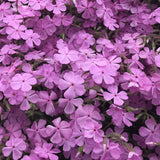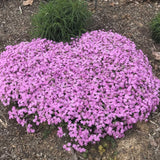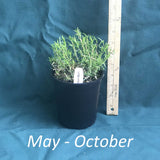Trailing Phlox is an easy-to-grow perennial that becomes enveloped by bright pink flowers when it blooms in spring.
- Flowers provide food for early emerging pollinators
- Low growing plant with a weed-suppressing mat-like habit
- Thrives on neglect
Details
- 4 to 8 inches tall
- 18 to 36 inches wide (plants grow wider in fertile soil)
- Narrow needle-like evergreen leaves
- Hardy in USDA hardiness zones 6, 7, 8, and 9
Flowering period
In central North Carolina, flowering starts in March and lasts three to four weeks.
How to grow
Prefers sun, though plants will still flower in part shade. Can grow in a variety of soil types, including clay, as long as it drains reasonably well. Plants are drought tolerant!
Care and maintenance
Plants are carefree and look after themselves
Where to plant
At the edges of flower beds, along paths, and planted on slopes to help stabilize the soil.
When to plant
Trailing Phlox can be planted year-round in the South, with spring and fall being the best times for plant and gardener. Remember to regularly keep plants watered if planting in the summer.
Spacing
Around 24 inches apart when planting in a group.
When will my plant flower?
Plants are flowering size and if purchased before March, they will bloom their first year.
Native habitat and range
Phlox nivalis can be found growing on rock outcrops and roadbanks in the southeast United States from south-central Virginia into Florida.
Source and origin
Plants are grown from cuttings here at the nursery. Our stock plant was grown from cuttings collected along the edge of a woodland in Chatham County, North Carolina.
| States | Orders up to $50 | Orders $51 to $100 | Orders over $100 |
| AL, DE, GA, KY, MD, NC, OH, PA, SC, TN, VA, and WV | $16 | $18 | $20 |
| AR, CT, FL, IL, IN, LA, MA, MI, MO, MS, NH, NJ, NY, RI, VT, and WI | $18 | $20 | $22 |
| IA, KS, ME, MN, OK, and TX | $20 | $22 | $24 |
| CO, NE, ND, and SD | $22 | $24 | $26 |
Sorry, we can't ship plants outside of the continental United States or to AK, AZ, CA, ID, NM, NV, OR, UT, and WA due to agriculture restrictions.
We now ship Sarracenia plants bareroot (while dormant during the winter) to Western States. Please contact us with your zipcode for a shipping quote.
When will my order be shipped?
All plants are shipped within two weeks of placing an order.
Is it okay to plant in the winter?
Yes, as long as the soil is not frozen. Planting native perennials in winter and early spring gives your plants a head start before the summer heat arrives.
What if it’s too cold to plant where I live, but I want to buy a plant before it sells out?
Dormant plants can safely be kept in a basement, garage, or cool room until you are ready to plant in late winter or early spring.
How will my plants get delivered?
Most orders are shipped on Monday or Tuesday with either UPS Ground, USPS Ground Advantage, or USPS Priority Mail, which depending on the destination takes between 1 to 4 days.
Are your plants shipped in their containers?
Yes, all our plants are shipped in their growing containers. The majority are grown in containers that are 4.5 inches wide by 5 inches deep and 32 fl. oz. / 946 ml in volume.
Do you guarantee your plants?
We guarantee our plants to be healthy, ready for planting and correctly named. We are not able to guarantee whether a plant will grow in your garden as there are too many circumstances that are beyond our control.
On rare occasions, a plant shipped dormant may fail to emerge from its dormancy. If this happens, please let us know. If you are concerned about a plant, please contact us within 14 days to let us know. If we can’t help you make it grow, we’ll send you a new plant or issue a refund.
Can I return my plants?
You can return your plants if you no longer want them once they arrive. To receive a refund (minus 20% restocking fee) the plants must be returned in good condition. Return shipping is the customer’s responsibility.
Can I cancel my order?
Yes, you can cancel your order. Please visit our terms and service page for details.
What about sales tax?
We propagate our own plants and are not required to collect North Carolina sales tax.
Where can I find information about your plants?
Here are some FAQ on how we grow plants.











